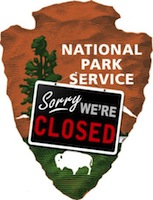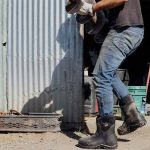 The shutdown of national parks, monuments, forests, refuges, recreation areas and thousands of campsites may have done more to demonstrate the enormous economic impact of the outdoor recreation industry than any research or Congressional testimony ever could. But whether and how that will shape spending and management of public lands remains unclear.
The shutdown of national parks, monuments, forests, refuges, recreation areas and thousands of campsites may have done more to demonstrate the enormous economic impact of the outdoor recreation industry than any research or Congressional testimony ever could. But whether and how that will shape spending and management of public lands remains unclear.
Within days of the shutdown, western governors once perceived as being among the most hostile to outdoor recreational interests, were requesting they be allowed to reopen national parks in their states. In an Oct. 8 letter to President Obama, Utah Gov. Gary Herbert said the closing of federal lands was decimating businesses and costing the state about $100 million a day. Governors of South Dakota, Arizona and Colorado sent similar letters. Taken to task by Outdoor Industry Association (OIA) in 2012 for signing legislation aimed at a state takeover of federal land in Utah, Herbert on Thursday became the first governor in the country to reach an agreement with Sec. of Interior Sally Jewell to reopen national parks using state funds. The agreement calls for Utah to pay the National Park Service up to $1.67 million to keep eight site open for 10 days. Governors in South Dakota, Arizona and Colorado are pursing similar agreements.
Industry advocates welcomed the media spot light on how the closing of national parks and other federal lands were affecting local communities, but were wary of short-term solutions that allow states to states to selectively reopen individual units of the National Park Service.
“Our message to Congress has been to reopen all federal land, so we have not been working with governors to open any particular units,” said Kirk Bailey, vice president of government affairs for Outdoor Industry Association (OIA). “The industry is so broad. Some companies are connected with parks, some with recreation areas managed by the U.S. Army Corps of Engineers (USACE) and some with national wildlife refuges. For our industry to thrive, all those have to be open to our companies and the American public.”
National parks emerged as a popular symbol of the shutdown in the media, which generated hundreds of articles with images of gated parks and estimates of the economic damage to the local tourism industry. The wires picked up on the Coalition of National Park Service Retirees estimate that that 7 million people had been kept out of national parks and $750 million in visitor spending lost in the first 10 days of the shutdown.
“These figures are mind boggling and they only begin to capture the full economic shock of locking up the crown jewels of America our national parks,” read a press release by CNPSR Chair Maureen Finnerty, former superintendent of Everglades and Olympic National Park. “If Congress continues to hold our national parks hostage, these communities will soon be reeling from what is in many cases the main driver of their economies.”
The Theodore Roosevelt Conservation Partnership noted that the closing of the national wildlife refuges would cut into billions of dollars in spending by hunters and fishermen. “Given the substantial economic contributions made by sportsmen to our outdoor-recreation-driven economy and given the shutdown’s timing, which coincides precisely as hunting seasons are getting under way the impact will assuredly be substantial,” said TRCP President and CEO Whit Fosburgh.
In North Carolina, a university professor estimated the shutdown reduced visitor spending by $33 million in 18 counties surrounding Great Smoky Mountain National Park the nation’s most popular national park.
Moab marks ground zero in Utah
On Thursday, OIA began surveying its members to gather information for Congressional hearings scheduled for next week that will examine the handling of the government shut down and its econmoic impact. The office of Sen. Mike Lee, the Utah Republican who worked closely with Sen. Ted Cruz of Texas to use the budget process to repeal the Affordable Care Act, quickly agreed to a conference call with the Utah Outdoor Business Network (UOBN) to talk about the threat to the town of Moab, where tourism visits spike in October as mountain bikers flock to the area to tour nearby national parks.
On Thursday, OIA began surveying its members to gather information for Congressional hearings scheduled for next week that will examine the handling of the government shut down and its econmoic impact. The office of Sen. Mike Lee, the Utah Republican who worked closely with Sen. Ted Cruz of Texas to use the budget process to repeal the Affordable Care Act, quickly agreed to a conference call with the Utah Outdoor Business Network (UOBN) to talk about the threat to the town of Moab, where tourism visits spike in October as mountain bikers flock to the area to tour nearby national parks.
Moab emerged as ground zero for the crisis in the Utah. The towns bike tour operators, bike shops, restaurants, hotels and other businesses were essentially running on fumes last week as visitors who had booked trips before the shutdown were turned away from national parks sought other diversions. (See BOSS 1341). The reopening of parks Saturday provided an immediate sense of relief and may help the town salvage the rest of the critical month of October, said Ashley Korenblat, owner of Western Spirit Cycling, one of Moab’s bike tour operators.
A former chairwoman of the International Mountain Biking Association, Korenblat formed the OUBN last year to facilitate the voice of business in public land issues. Rather than insisting that all members share a common set of values or principles regarding public land, the network tracks public land issues and then lets individual businesses opt in depending on their interests.
“If your business depends on public lands being in their natural state, it’s part of your job to get involved,” said Korenblat, who serves on the recreation advisory panel for OIA. “For outdoor companies like Patagonia, Black Diamond and Petzl, that’s core to their brand, but there are other folks who may want to be involved but not want to use the same tone or language as the conservation community. So we are trying to make sure UOBN has a business focus.”
For instance, more than 80 companies have signed on in support of a letter UOBN sent Utah’s Congressional delegation Oct. 4 urging them to reopen federal lands. Many were hotels, restaurants, retailers and other ancillary businesses that who may not share the agenda of the Sierra Club, but rely on the tourist spending drawn by the state’s iconic national parks and monuments and recreation areas.
“The old paradigm was the conservation community took care of the land issues and the outdoor industry wrote the checks and now and then got involved directly,” said Korenblat. “Now we are in a situation where the recreation economy is much more complex and the tools of the conservation community we relied upon are not always helpful. The new paradigm is recreational business interests have to speak with their own, strong voice on public land issues.”
Murky agendas
Back in Washington D.C. and Boulder, OIA’s five-member government affairs team was busily gathering information from the outdoor recreation companies in response to queries from various Congressional committees.
Back in Washington D.C. and Boulder, OIA’s five-member government affairs team was busily gathering information from the outdoor recreation companies in response to queries from various Congressional committees.
“We’ve gotten a lot of folks interested in knowing the impact, but what they do with it is the question,” said Bailey.
Bailey and Korenblat both said they are wary that some may use the crisis to bolster their argument for state takeovers of federal lands. In 2012, Gov. Herbert signed a bill widely dismissed as unconstitutional – calling for the federal government to turn over all federal land to the state of Utah.
Bailey and Korenblat both said they are wary that some may use the crisis to bolster their argument for state takeovers of federal lands. In 2012, Gov. Herbert signed a bill widely dismissed as unconstitutional – calling for the federal government to turn over all federal land to the state of Utah.
“I think the closing and opening of these public lands could move into another debate,” said Bailey. “We applaud Gov. Herbert for trying to preserve jobs in his state, but a short-term crisis should not be used to determine long term policy.”
Late Friday, Bailey said OIA has heard from many paddlesports outfitters who have had to cancel trips because the USACE, which manages the largest number of recreation sites of any federal agency, has closed. In Virginia Beach an outfitter reports October sales are off 80 percent because he can’t paddle through federal property to reach trails in a state park.
“I think it is a pivotal moment for the industry and for the country,” said Bailey. “We’ve known for a long time that the country supports national parks, forests and waterways by huge margins and there is a growing appreciation for their economic impact. This shutdown has caused a convergence of these two messages and it's triggering a big response, but the response is kind of all over the map.”
For instance, House Natural Resources Committee Chairman Doc Hastings (R-) has scheduled a hearing into the closing of the national park system for Wednesday. Dubbed “As Difficult as Possible: The National Park Service’s Implementation of the Government Shutdown,” the hearing intends to show that the Obama Administration closed federal lands unnecessarily to maximize the pain of the government shutdown and create a backlash against Republicans in Congress.













